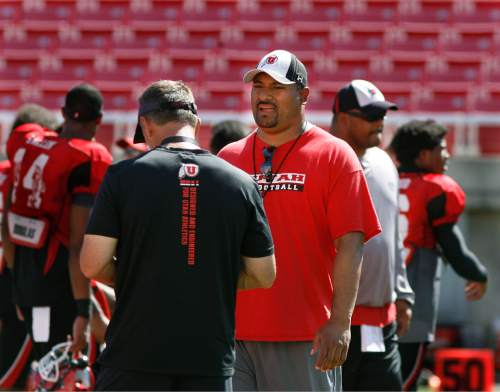This is an archived article that was published on sltrib.com in 2015, and information in the article may be outdated. It is provided only for personal research purposes and may not be reprinted.
Las Vegas • My enduring image of Kalani Sitake is the night of Utah's upset of No. 5 Stanford in October 2013, when he walked out of Rice-Eccles Stadium, holding the hand of his young son and humbly accepting congratulations.
Sitake's fourth-down call of Ute linebacker Jared Norris' blitz that disrupted Stanford's pass attempt into the end zone clinched the 27-21 victory, but the defensive coordinator would not take any personal credit.
That's Kalani.
He's unproven as a head coach. Otherwise, he fits everything BYU could want. He's humble, yet confident in his ability. Recruits are impressed by him, players respond well to him and everybody who knows him likes him personally.
As with any head coach, Sitake faces a big responsibility in hiring his staff — particularly on offense. That's the biggest unknown about BYU's hiring of him, although he logically will keep the framework of BYU's traditional passing scheme. That's the offense he played in as a fullback, and he's sure to take advantage of quarterback Tanner Mangum's skills.
As I wrote two weeks ago, that was my big question about Navy coach Ken Niumatalolo, who would have been anyone's No. 1 choice in every other respect. His choice to turn down BYU's offer almost certainly had something to do with his triple-option offense. Ironically enough, Niumatalolo is attending Saturday's Las Vegas Bowl between BYU and Utah, because his son Va'a is a Cougar linebacker.
In any case, the option issue was the reason I listed Sitake as my pick for the job — both as my preference and my prediction. He will make this work.
Sitake cites many influences in the coaching profession, and there's a nice tie to the LaVell Edwards era. Sitake's college career ended with Edwards' final game, a 34-27 victory over Utah in 2000.
I would point to Sitake's varied experiences with Gary Andersen as critical in his background. He joined in Andersen's one-year revival of a downtrodden Southern Utah program in 2003, they worked together for four seasons at Utah when they maximized all kinds of defensive talent and they struggled through a 2-10 season this year at Oregon State, with an obvious lack of personnel.
Persevering in tough times may be good experience for Sitake in 2016, when BYU tackles a very ambitious schedule. In the long term, he will succeed at BYU, performing humbly yet confidently.
Twitter: @tribkurt



